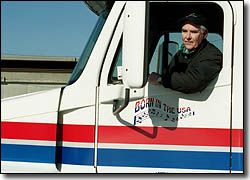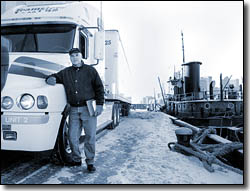Truckin’ Toward a Degree in Natural Sciences

Fifteen years ago, Bob Burns attended “Public Night” at the Harvard-Smithsonian Center for Astrophysics. “Once I discovered the brilliant sky and the cold-looking stars through the telescope, I didnt miss a lecture for three years,” he said. “At one of the lectures, [Astronomy Lecturer] Sam Palmer gave a one-hour talk . . . He mentioned that he taught a class in astronomy at the Harvard Extension School. After some serious thought I got a catalog and enrolled in his class.”
That was in the spring of 1992. This June, Burns will receive a bachelors degree in natural sciences. Yet, his extended journey toward a college degree, admirable as it is, is not the most exceptional thing about Burns. Hes also probably the only trucker studying astrophysics in the history of Harvard.
Burns, 56, is a teamster in good standing with more than 28 years of experience as a trucker. He drives a tandem tractor-trailer unit for a national trucking company and makes deliveries and pickups in the metro Boston area on top of going to class two nights a week at the Extension School. Sometimes that means bringing his work to school though most people have great difficulty finding parking in Harvard Square, Burns often comes to class in his 60-foot-long rig.
From the Earth to the Stars
So how does a career teamster wind up at Harvard? “In 1985, I was on a cosmological search, rather a spiritual search, seeking a power greater than myself,” Burns recalled. “Or at least I wanted to learn more about the truth of the planet and the universe. I decided the astronomy lectures would be a good place to start.”
Burns arrived at this upward trajectory after many years spent hugging the earth. As a young man, the self-proclaimed “child of the 60s” studied dairy cattle production in a summer program at Utah State University to prepare him for the Peace Corps. After receiving his training, Burns worked with the ministry of agriculture in Iran, though things did not end up quite as he expected.
He didnt work with cows, nor did he much use his university training. “I got to use my brawn more than my brain helping peasant farmers,” he said.
After returning to the United States, Burns took some classes at Boston University. But needing to earn a living, he soon took a job as a truck driver, a job at which hes worked faithfully for nearly three decades. All the while, though, he was still looking for something else.
Two Worlds
“It is like stepping into a different world,” Burns said about leaving work and coming to school. “I have to be careful of my vocabulary use. Today I used the word precipitate and was accused by a co-worker and a boss of showing off my Haaavaad education. Unlike the supportive environment around the campus, there is no encouragement at work to improve oneself. The general attitude, in my experience, with my fellow teamsters is, once a teamster always a teamster. The rigid seniority system is a two-edged sword in that it may provide protection to prevent you from unjustly losing your job but at the same time there is no room or encouragement to grow.”

Though Burns has let his workmates know of the opportunity that open-enrollment provides at the Extension School to the point of bringing catalogs to the job site no one yet has decided to take advantage of his offer to provide an introduction to the program. At least one of Burns fellow workers is proud of him, though. “The chief mechanic has told me he wants to come to my graduation in June.”
Burns does find that his education helps when dealing with customers along his route. “Clients often acknowledge my vocabulary and ability to express myself clearly,” he said. “When the occasion arises to have an in-depth discussion, these people are often amazed at both the depth and breadth of my acquired knowledge. There is a generally shared and unfair stereotypical attitude toward truck drivers and others who do physical labor. People are very surprised when I tell them of my desire to go on to graduate school.”
Fitting into an Academic Environment
When driving, Burns dresses accordingly for weather and safety conditions. When at school ” . . . dressing like a grad student has become a subconscious act,” he said. “I even have a soft leather briefcase with a shoulder strap, an ample supply of turtleneck jerseys and color-coordinated sports jackets, and to traverse the Yard a special pair of Timberland boots.”
His personality also changes when he gets on campus. “Another difference between the atmosphere at work and on campus is that during work radios are mostly tuned to music; when I control the radio dial I listen to National Public Radio,” Burns said. “All Things Considered and Christopher Lydons program are my favorites.
“Sometimes I think I am addicted to learning. Learning in all areas appeals to me. I create my personal calendar of events after reviewing the weekly directory of lectures published in the Gazette. I hate to admit how many times Ive waited in line to gain access to the ARCO Forum to hear a famous authority speak.
“I have a poster that says, Dull people talk about other people, average people talk about events, and intelligent people explore ideas. My experience at the Extension School has taught me that the exploration of ideas helps me grow.”
Planning and Parking for the Future
With almost 30 years as a teamster, Burns is close to qualifying for retirement. He is pondering a pension buy-out option and is ready to explore his options in the area of environmental health as well. He credits the Career and Resource Center (CARC) and his academic advisers at the Extension School for providing the tools he needed to succeed.
“Not only did I get personal encouragement but I learned that if I could tell my advisers where I wanted to go, Harvard would help me get there,” he said. ” I never believed the possibility of going to graduate school could become a reality. I never looked beyond a B.A., but now I am meeting other graduate students and professors who are encouraging me to go for it. I am vigorously exploring masters degree programs in environmental health.”
Which leaves just one question: Where does he park that 60-foot-long truck, anyway?
Burns, who is truly streetwise, said softly, “at Harvard, you learn more than what they print in the catalog.”




